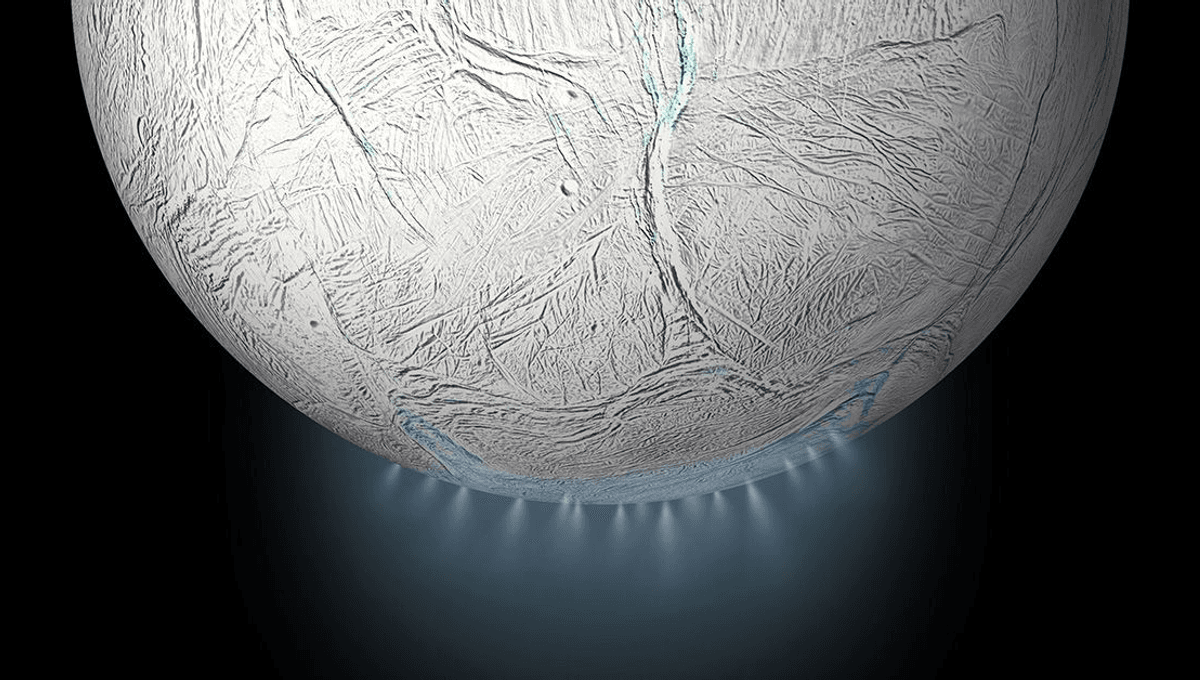
The plumes pushed out by Enceladus’s geysers are powerful enough that a visiting spacecraft could sample the small moon’s innards without having to land. Moreover, they’re also sufficiently gentle that if the molecules needed to get life started exist in Enceladus’s internal ocean, they won’t be destroyed by being spat out, leaving them free to be collected intact by future space missions. The same should be true for Europa, raising the chance that something really exciting awaits us when the Europa Clipper reaches Jupiter.
Saturn’s moon Enceladus has a liquid water ocean under its icy shell and several recent studies have revealed all the ingredients for life exist there. What we don’t know is whether these have come together to form amino acids, frequently referred to as the “building blocks of life”. However, with geysers shooting samples of this ocean into space, a spacecraft ought to be able to find out, provided we fit it with suitably sensitive equipment.
There’s one fly in this ointment, or at least there was thought to be. Complex molecules can’t handle extreme forces without breaking up into their component elements, or at least simpler molecules. Astrobiologists feared that if Enceladus does have amino acids, and perhaps even DNA, bobbing around inside, they might be destroyed by the impact of slamming into a spacecraft’s collecting plate.
If so, this would leave future missions none the wiser, a sad repetition of the idea we found life on Mars and killed it. If true, we would be dependent on landers, and probably bizarre robots like this snake, to collect samples from the inner ocean intact.
The good news is that, according to Professor Robert Continetti from the University of California San Diego and colleagues, that won’t be necessary, because amino acids are tough enough to survive the journey. Indeed, the authors calculate, they’re rated capable of surviving impact speeds of at least 4.2 kilometers per second (2.6 miles per second), 10 times faster than molecules sprayed out through Enceladus’s geysers are thought to face. This sets a very practical maximum velocity for spacecraft trying to catch grain while passing through a plume.
Continetti built an aerosol impact spectrometer to see what happens when aerosols and other particles collide.
“This apparatus is the only one of its kind in the world that can select single particles and accelerate or decelerate them to chosen final velocities,” Continetti said in a statement. “From several micron diameters down to hundreds of nanometers, in a variety of materials, we’re able to examine particle behavior, such as how they scatter or how their structures change upon impact.”
Although not planned that way, one thing the spectrometer is excellent at is slamming ice grains, like those Enceladus spits out, into surfaces and studying the consequences.
If, as we hope, Enceladus has amino acids inside, they would probably be carried into space aboard ice grains like this.
“The implications this has for detecting life elsewhere in the Solar System without missions to the surface of these ocean-world moons is very exciting,” Continetti said.
We know much less about the situation on Europa, where the geysers come and go, and any connection to the inner ocean is uncertain. Still, while a mission to Enceladus is purely hypothetical, all going well we will be sampling particles from Europa’s vicinity quite soon. Consequently, it’s very relevant to know amino acids are tough enough that they stand a good chance of survival if any are undergoing a similar journey.
The research is open access in Proceedings of the National Academy of Sciences.
Source Link: If Enceladus Or Europa Have Life It Might Be Easy To Find